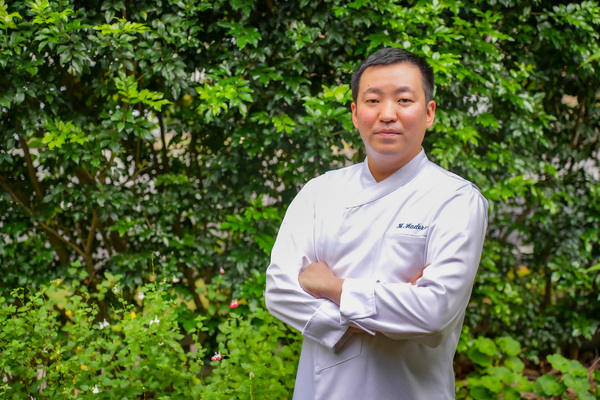
Where are you from? : Tsukuba, in Ibaraki prefecture
Restaurant: Chef to the Consul-General of Japan in Sydney
For 12 years now. My career started after university when I moved to San Francisco and I worked there in a Japanese restaurant there for about three and a half years. I realised though that if I was serious about further pursuing Japanese cooking then I needed to learn in its original home and so I moved back. I trained always with the idea in my mind of taking what we have in Japan and sharing our cooking and culture with those from other countries and around the world. Through good fortune I have now had the chance to become chef here at the consul-general in Sydney.
Three months. I already feel that this is a great country to live, but my life here in Sydney is only just getting started and I’m looking forward to meeting new people and experiencing a lot more.
Yes, I spent about eight years working in Tokyo focusing mainly on kaiseki cuisine and then a further two years studying western cuisine at a French restaurant. Having the chance during that time to meet and work with Michelin star chefs and colleagues at those restaurants and share a heightened awareness and respect towards cooking was formative for my career.
I learned in San Francisco for those three and a half years, and then for eight years in Tokyo at a high-class kaiseki restaurant.
When I first started working in San Fransisco, I met a lot of people from other countries who were actually a lot more interested in Japanese cooking and culture than I was. As I learned to shave bonito, how to best soup stock and seasoning for Japanese food, I felt ashamed for not knowing more about my own country and this was the trigger which was the trigger which lead me to dedicate myself to Japanese food culture.
After returning to Japan I began learning the tea ceremony, learned about sake brewing and pairing and visited many distilleries, and I even went on some fish trawlers. I became more motivated about actively pursuing what interested me. My father worked at a traditional Japanese ryotei restaurant and I had always felt a close relationship to cooking.
Because the environment and climate are different in each country, trying to do things exactly as they are done in Japan can feel a little restrictive or awkward. The essential core of cuisine in the different regions of Japan is about using those traditional cooking techniques and knowledge to prepare locally-sourced ingredients in a way which works with the local environment. This idea remains is important to always connect back to Japanese food culture.
Information has become more readily available, the distance between countries smaller and people have become increasingly mobile, and there are ever more chefs bringing their own unique backgrounds and experiences. I think it is an inevitable development and evolution that cooking itself takes on these new influences and elements. What I think is important is not how the food looks, but that it follows the deep respect toward nature which is very important in Japanese culture, as well as the ways of thinking or mystical part such as politeness and respect in Japanese cooking.
I have always been deeply impressed by Seiji Yamamoto of Ryugin in Tokyo for his dedication and attitude towards Japanese cooking.
Hajime Yoneda of HAJIME in Osaka has also been an inspiration in how he builds a story for each dish and how he is trying new things in the food and beverage industry.
From a broader point of view, including how she thinks about cooking, I have been greatly influenced by Alice Waters who is the owner of the restaurant Chez Panisse in Berkeley, USA.